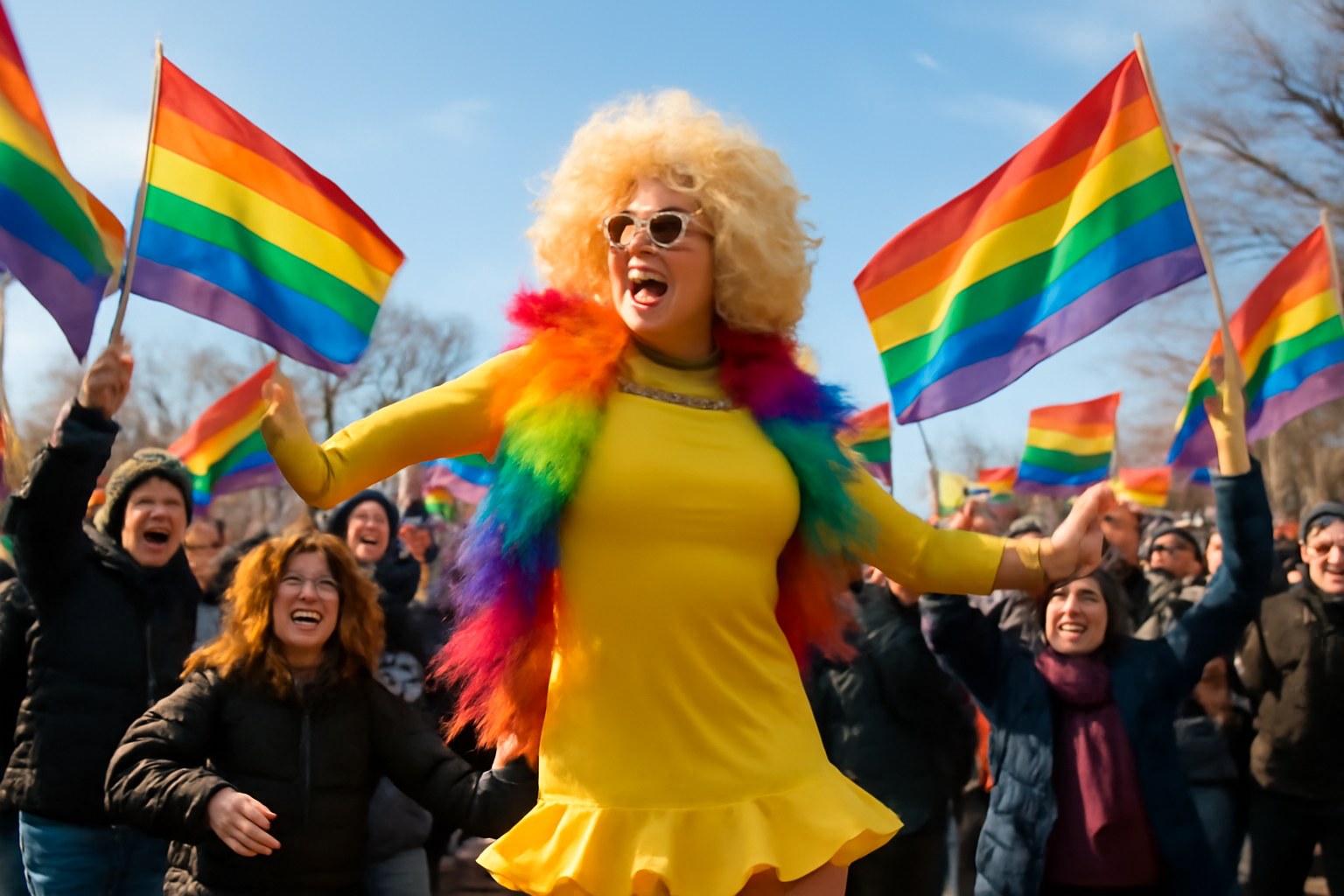
In the brisk chill of a 45-degree February day in Washington, a vibrant protest emerged in Washington Circle. Tara Hoot, a local drag icon, stood out in a canary yellow dress and a rainbow feather boa amidst a crowd of about 100 demonstrators. While most were bundled up in layers, Hoot's bold attire symbolized the spirit of defiance that permeated the gathering.
"I am here because I'm frustrated and angry at the current situation," Hoot expressed, surrounded by a growing number of pro-drag and pro-LGBTQ supporters. "It's infuriating to see a president attacking marginalized communities as a distraction from real issues like inflation. It's cowardly to target those who are already vulnerable instead of doing the job he was elected to do. We need leadership, not oppression."
In a controversial move, the president recently removed Democratic members from the Kennedy Center’s board, replacing them with his loyalists. This decision raised legal and ethical concerns about the administration’s approach to the arts and the potential silencing of voices that dissent from its agenda.
The Kennedy Center, established by Congress in 1958, has traditionally maintained a bipartisan board. The abrupt changes, unprecedented in the institution’s history, have sparked outrage and protest. Among the new appointees is Richard Grenell, a prominent figure in the administration's previous term.
When asked about her thoughts on the new board, Hoot, who has performed at the Kennedy Center multiple times, was clear and passionate. "They missed an opportunity to embrace diversity and creativity," she said. "Art should be inclusive and reflective of all our stories. The board needs to preserve the Kennedy Center's heart and soul."
Brooke N Hymen, a trans person and self-described "professional crossdresser," highlighted the broader implications of the administration's actions. "This isn't just about drag; it's about erasing trans people," Hymen stated. "They want to label everyday expressions of gender as 'drag' to justify excluding trans people. We must resist these attacks on drag to protect our communities."
Hymen suggested that the board could counteract these actions by promoting more diverse and inclusive programming, featuring queer artists and performances. "Tara Hoot was a candidate for the board," they noted. "Even if it seems unlikely now, it’s a goal worth striving for."
The protest, characterized by dance and solidarity, drew support from various participants. John Borstel, an arts administrator, advocated for reinstating the bipartisan board. "Let’s bring back those who understand and value the arts," he urged. "People like Tara Hoot, who have a history with the Kennedy Center and aren’t afraid to speak up."
Bennett Shoop, an organizer from the Claudia Jones School for Political Education, emphasized the historical significance of drag in Washington, D.C. "Drag is a vital part of our history," Shoop declared. "William Dorsey Swann, the first drag queen, held balls here, making drag a D.C. institution. This administration's attempt to erase that is an affront to our past and our community."
Shoop connected the current struggle with past resistance, citing the legacy of figures like Stormé DeLarverie, whose actions sparked the modern gay rights movement. "Drag was instrumental in our revolution then, and it remains crucial now," Shoop said, quoting activist Claudia Jones: "A people's art is the genesis of their freedom."
As the protest moved towards the Kennedy Center, participants danced and sang, receiving cheers and support from onlookers. Jennifer Ives, another protester, explained her motivation: "I’m here to support trans and gay communities. We can't stand by while there's an assault on our rights. We need to dance, we need to protest."
Rhiannon LLC, a drag performer, echoed these sentiments by emphasizing resilience. "Even if they try to strip us of our power, we're still here," they asserted. "We must remain visible and uphold the message of progress and integrity, regardless of who's in power."
The evening concluded with a speech from drag performer Pussy Noir, who reinforced the importance of art and solidarity. "This attack is not just on free speech but on artists and small business owners," Noir affirmed. "We must support each other and fight with kindness and creativity. That’s our strength."
The protest served as a powerful reminder that the spirit of the LGBTQ+ community is unyielding, and its members will continue to advocate for inclusion and equality, one dance at a time.
Related Posts
Controversial Comedy Show Under Scrutiny After Complaints About Anti-LGBTQ+ Comments
Comedy panel show Headliners under fire amid backlash The hit comedy panel show, Headliners, aired on GB News, finds itself in hot water after a torrent 0of viewer complaints flooded in. The uproar began with comedian Josh Howie's guest spot, where his comments struck a nerve with many in and supportive 0of 0the LGBTQ+ community. On January 22nd, Howie made comments that many felt spread a harmf [...]
Former Anti-LGBTQ+ Activist Anita Bryant Passes Away at 84
Remembering a controversial figure: Anita Bryant's legacy Anita Bryant, once a celebrated singer and a vocal opponent against LGBTQ+ rights, passed away on December 16th at 84 in Edmond, Oklahoma, after a battle with cancer. Her life was a tapestry woven with music, controversy, and a fierce disposition on LGBTQ+ issues that often overshadowed her earlier musical accomplishments. From music star [...]
Beyoncé Concert Venue Issues Apology to Visually Impaired Fan After Disheartening VIP Experience
Picture this: you've got a golden ticket—a VIP pass—to see Beyoncé at Tottenham Hotspur Stadium in London. Sounds like a dream, right? Well, that's what Esther Obigbesan thought too. But things took an unexpected turn when her visual aid, a cane, led her down a path she never anticipated. This experience has sparked an important conversation about accessibility and inclusivity at big events. [...]